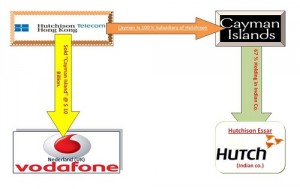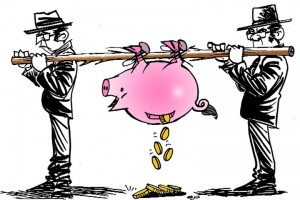In this blog post, Vikram Chandhuri, a Student of Department of Law, Calcutta University, who is currently pursuing a Diploma in Entrepreneurship Administration and Business Laws from NUJS, Kolkata, discusses the power of tax authorities to look into past transactions and demand tax.
The tax authorities’ power to look into past transactions and demand tax is known as “Retrospective Taxation”. The word “Retrospective” means something related to the past. Retrospective Taxation means taxing past transactions with the new laws. With the help of this type of taxation, the government of a country can tax any transaction which was done even before the passing of the new law.
To understand it, let us take one example. If one transaction was taxed at 10% in the year 2010, and the tax rate changes to 13% in 2012, then the Income Tax Authorities can demand that the previous transaction should also be taxed at the rate of 13% by giving themselves the power of ‘Retrospective Taxation’. This allows it to look into previous transactions, and make corrections.
The power of tax authorities in India
The Government of India introduced the Retrospective Taxation System in 2012 by amending the Income Tax Act, 1961 and announcing that the amendments would be in effect retrospectively from 1st April, 1962. This meant that the Government could now look into previous transactions and demand tax and this decision was based on the Vodafone Tax Case between the Government of India and the British Telecom Major, Vodafone.
Vodafone tax case
Sometimes DTAA (Double Tax Avoidance Agreement) are signed between two countries to attract foreign investments. Now, India had signed a DTAA with Mauritius and according to this agreement, the taxpayer can pay in either of the two countries. Now in the case of Vodafone, there was no capital gains tax in Mauritius and they had easily avoided paying any tax there.
Hutchinson was a Honk-Kong based group which made its Indian investment through a listed company in Hong Kong, which in turn held shares in downstream companies in the Cayman Islands, which in turn held shares in companies based in Mauritius. As earlier stated, there was a DTAA signed between India and Mauritius. Thus, the ownership structure of Hutchinson was extremely complicated.
In 2007, Vodafone acquired 67% of Hutch-Essar, a joint venture between Hutchinson-Essar Group. The acquisition was made by Vodafone International Holdings of CGP Investments (a company incorporated in Honk Kong but a resident of Cayman Islands for tax purposes) for a sum of Rs 55000 Crores from Hutchinson Telecommunications International Lmt. (HTIL)
It was clear that this type of complex transaction was made to avoid giving taxes to the Government of India. The Income Tax Department of India contested that as Hutch-Essar was an Indian company, the transaction was liable to tax capital gains under Section 9 (1)(i) of the Indian Income Tax Act, 1961. Even though CGP Investments were not a resident of India, the underlying assets were in India and the profit generated from the business was also in India. Therefore, the Income Tax department demanded a sum of Rs 11000 Crore. Vodafone contested this saying they were not liable to pay any tax as they were not residents of India, and saying that the deal was made outside India. After this Vodafone filed a Writ Petition in the High Court of Bombay, but the decision was ruled in favour of the Income Tax Department. Then Vodafone moved to the Supreme Court, and the decision was overturned, and was ruled in favour of Vodafone.
After that the Government of India, amended the law retrospectively thereby giving the Income Tax Authorities the authority to look into past transactions and demand taxes. This was done so that companies could not avoid paying taxes from Tax Havens like Cayman Islands. The Income Tax Department has slapped Rs 20000 Crore Penalty on Vodafone.
The other notable cases in relation to Retrospective Taxation are Nokia, Honda all facing huge amount of penalties due to Retrospective Taxation.
Impact of retrospective taxation
The Retrospective Taxation system introduced by the UPA Government in India had a huge impact. Although the Government could now earn a huge amount of revenue in taxes, it tarnished India’s reputation as a place for doing business. To change a country’s taxation system on a whim has resulted in a decrease of foreign investors in India. Foreign investors are only ready to invest when the taxation systems are certain. This amendment decision has created uncertainties in the business world.
The Government of India had established two committees to look into the matter of Retrospective Taxation. The first one was the ‘Parthasarathi Shome Committee’ which opined that the amendment was against the basic doctrine of law. The other committee was the ‘M. Damodaran Committee’ which said that this type of sudden changes should be avoided and that it is imperative for a nation to have certainty and continuity in its rules and regulations. Retrospective Taxation is also against the spirit of Double Tax Avoidance Agreements (DTAA).
This system of retrospective taxation should only be used in certain situations where the transaction has not been taxed anywhere in the world and has underlying assets in India. However the Income Tax Department has disregarded the judgement of the Supreme Court with ease by amending the Law. During the reign of the UPA Government the same law was used to raise a tax demand of Rs 10247 Crore on Edinburgh based Cairn Energy.
The retrospective taxation should be avoided as a principle as it creates confusion, uncertainty and lack of confidence in a nation’s ability to welcome foreign investments. Countries across the world such as Brazil, Greece, Mexico, Mozambique, Paraguay, Peru, Venezuela, Romania, Russia, Slovenia and Sweden have prohibited retrospective taxation.
The present situation in India
However the situation has changed. The new Finance Minister Mr. Arun Jaitley has said that investors want stability and predictability and they do not want to be hit by a surprise, and “therefore it is important that standards of fairness in taxation must be maintained.” Mr. Arun Jaitley was also of the opinion that retrospective taxation has only scared away foreign investors and that the previous Government had failed to collect any actual taxes. Moreover, a high-level Committee under the Central Board of Direct Taxes (CBDT) has been set up to examine any new case based on the amendments introduced in 2012, in direct transfers to avoid further legal action. The Finance Minister Mr. Arun Jaitley has also assured that no fresh retrospective tax creating fresh liabilities will be imposed by the Government.
The Prime Minister of India, Mr. Narendra Modi has said that the controversial retrospective taxation was a thing of the past and that chapter will not be opened again. He has assured that for the next 10-15 years, the taxation system of India will be the same, and that the Government will take steps so that the taxation system is stable.
The Income Tax Department on February 4, 2016 has sent a reminder notice to Vodafone International Holdings BV seeking Rs 1400 Crores in taxes. On one hand, the present Indian Prime Minister, has promised that companies will not be taxed retrospectively while on the other hand the Income Tax Department is demanding Rs 1400 Crores from Vodafone on the basis of retrospective tax.
Conclusion
The Finance Minister Arun Jaitley had promised that no fresh liabilities caused by retrospective taxation will be imposed by the Government in the case of Direct Taxes. There is a great difference between the words and the actions of the Government. When the Amendment was passed giving the Income Tax Department to demand tax retrospectively, it was hugely criticised by the business community. It created uncertainty and deteriorated the business environment. The taxation system of a country should be certain, and there cannot be any element of uncertainty.
The present situation in India is incredibly complicated. The Government needs to pass laws if they want to bring any change in the existing system. Direct Tax Codes should come into effect as soon as possible. The topic of retrospective taxation should be cleared immediately as it deters the foreign investors from investing in India.
 Serato DJ Crack 2025Serato DJ PRO Crack
Serato DJ Crack 2025Serato DJ PRO Crack













 Allow notifications
Allow notifications


